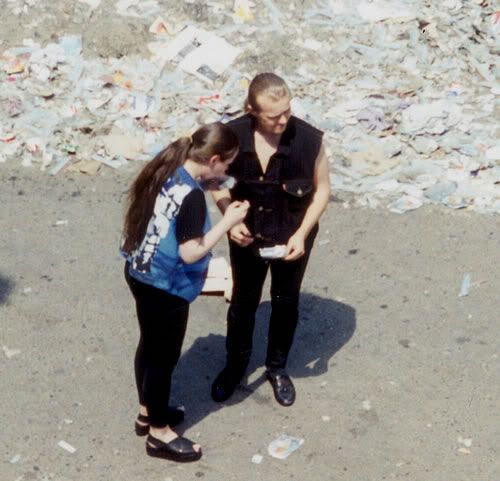Global Cool
Global Cool is no longer Global Americanisation. It may have started that way, but in the same way that having appropriated/absorbed black rock music, whites took it in entirely new directions, the same is true at a broader level with Global cool. Here is an example.
This is quintessential German cool: Love Parade 2006 in Berlin. It has nothing at all to do with casting an eye across the Atlantic, to see what the Americans are doing.

Meanwhile, here, from Flickr, is the ultimate in Anti-American Cool. Che Guevara, that icon of cool rebellion, had nothing on Bin Laden. Che took on a Banana republic, Bin Laden the world's only superpower. All this to say: Cool concerns itself with the local, here-and-now. Cool is not at all about loving the West, whence cool first emerged.
White Shame, Uncool

Cool emerged several decades ago at the crossroads of black and white America, as an African value of performance met the European value of individualism. In the context of a violently oppressive racial climate, cool was the expression of rebellion for rebellion’s sake.
Cool projected mastery of circumstance, naming itself an insider in a sea of outsiders. In our current climate, cool projects mastery not just of circumstance, but also of consequence. Consequence, literally, means something that follows. But cool cannot be subjected to consequence, because cool does not concern itself with tomorrow—only with today.
Cool will not own any guilt, because guilt refers to tomorrow. As a performance art, cool only exists for the moment. There is, however, an alternate to guilt that deeply concerns cool: shame. Cool refuses shame, because shame is circumstance’s mastery over oneself.
Beyond refusing to be shamed, cool projects shame onto all non-cool outsiders. Words for non-cool are always shameful (like “square”; or the homosexual slander of heterosexuals: “breeders”).
Back to race. During the black power movement, and ever since in the hip hop world, several African Americans, artists in particular, and men in particular, claimed cool as an essentially black cultural expression. Cool was a moment-by-moment refusal to belong to white society.
That’s when white guilt began to evolve into white shame. At least as late as the movie White Men Can’t Jump, whiteness had become tightly wrapped up with uncool. Today it’s everywhere. Young white Americans are deeply ashamed of being white, even as they decline to reject the privileges of whiteness. We talk of “White People” in the third person; we clamor for Black approval etc.
It’s not racial healing we beg for, it’s cool. Specifically, it’s absolution of our white uncool.
The more I’ve lived in a multiracial community, the more I’ve become convinced that white guilt is an irrelevant topic for most whites. It’s white shame.
Platzspitz from the Sky
map loading...
Here is an aerial shot of Platzspitz Park in Zurich, Switzerland. It was the site of Europe's largest heroin scene in the early 1990s. Here is a picture from the scene in its heyday.

Sevensongs
So I've been tagged. My editor, who is a pretty
interesting man in his own way, challenged me to
List seven songs you are into right now. No matter what the genre, whether theyhave words, or even if they're not any good, but they must be songs you'rereally enjoying now. Post these instructions in your blog along with your 7songs. Then tag 6 other people to see what they're listening to.
I thought I'd go ahead and one-up him with links to my songs on iTunes. Here are seven I'm into this summer.
 Sound of Running – The Old 97's
Sound of Running – The Old 97's No song by Merle Haggard or Willie Nelson comes close to this expression of fatalistic wanderlust. “The sound of running’s always racing me.” No other song about trains better describes compulsive flight and the meaning of life: “till they put me on the westbound, singing sweetly over me.”
 Crystal Frontier - Calexico
Crystal Frontier - CalexicoMuch of the world's pop music is made with an eye to what is happening in America. Calexico is my favorite American band that knows how to take a look south, across the border. The Crystal Frontier – a short story by Mexican novelist Carlos Fuentos – sings a song of so-close-but-so-far-away, all atop a mariachi beat.
 Kol Nidrei – Max Bruch
Kol Nidrei – Max BruchThis one is actually over a hundred years old. Max Bruch, wrote a ten minute instrumental song inspired by the sung prayer that opens the Jewish Yom Kippur liturgy. The violins and cellos here are haunting; check out the transitions between major and minor chords. Makes you want to cry with the sheer emotion of it all.
 File Under Futurism – Freight Elevator Quartet
File Under Futurism – Freight Elevator QuartetThe FEQ were the house band for Columbia University’s Computer Music Center up till a few years ago. This crazy bit of avant-garde uses cellos, drum machines, keyboards, djembe, didjeridoo, bass, buchla, software and turntables. And it rips.
 Dig That – Rob Dz Experience
Dig That – Rob Dz ExperienceThe emerging Madison (Wisconsin) sound crosses brass bands and hip hop and makes for hot parties for hot summer nights. Madison’s best rapper Rod Dz rhymes here with a funky horn section.
 Nuclear Summer – Youngblood Brass Band
Nuclear Summer – Youngblood Brass BandAnother example of the Madison sound. New Orleans-style marching band, with just a little Wisconsin polka thrown in for good measure, red-hot beats and staccato rapping. And being from Madison, the subject matter is bracingly political. Mmm.
 Dynomite (Going Postal) – Rhymefest
Dynomite (Going Postal) – RhymefestRhymefest is Chicago’s answer to Blackalicious. Dynomite combines great beats with intelligent verses for a high-tension warning to any would-be battle challengers. It’s excessively macho, but hey. It’s summertime.

Compassion
Compassion is the true opposite of cool. Discuss.
 Meanwhile, here, from Flickr, is the ultimate in Anti-American Cool. Che Guevara, that icon of cool rebellion, had nothing on Bin Laden. Che took on a Banana republic, Bin Laden the world's only superpower. All this to say: Cool concerns itself with the local, here-and-now. Cool is not at all about loving the West, whence cool first emerged.
Meanwhile, here, from Flickr, is the ultimate in Anti-American Cool. Che Guevara, that icon of cool rebellion, had nothing on Bin Laden. Che took on a Banana republic, Bin Laden the world's only superpower. All this to say: Cool concerns itself with the local, here-and-now. Cool is not at all about loving the West, whence cool first emerged.









 Author and Speaker
Author and Speaker
